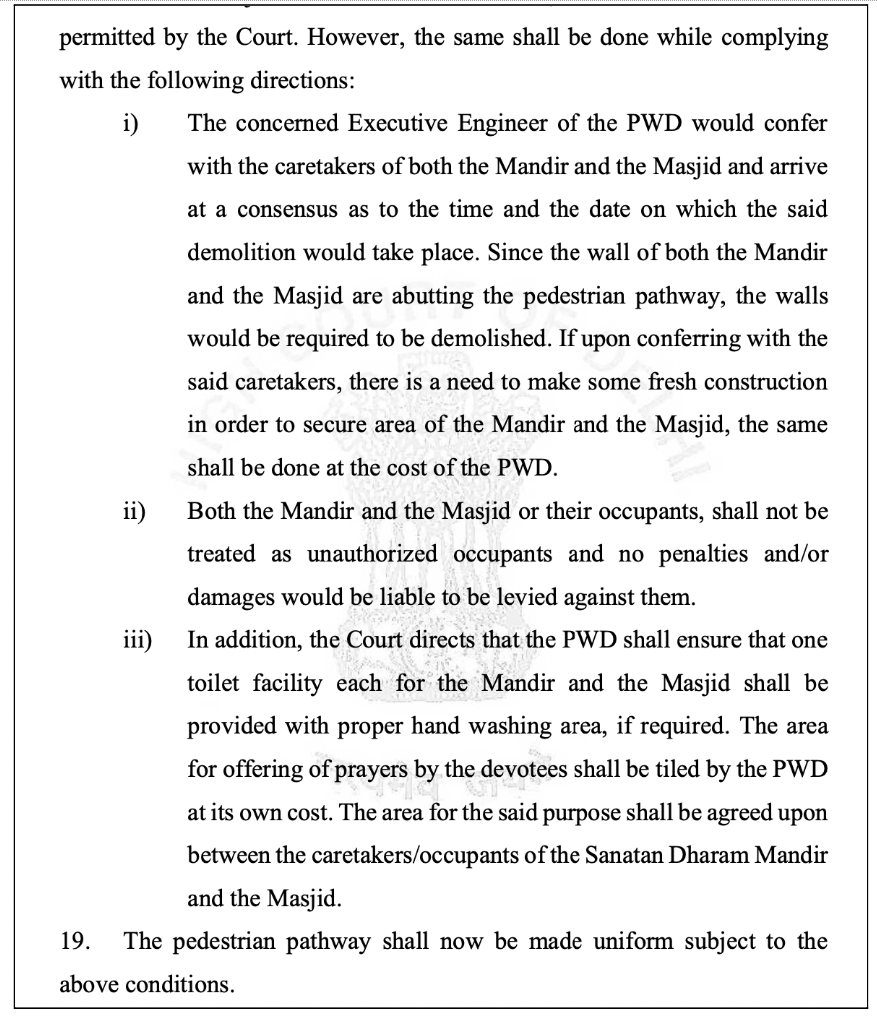In this week’s review of Court Judgments, we look at Supreme Court’s judgment regarding validity of differential compensation based on land classification and its clarification for an earlier order regarding adoption. We also look at Karnataka High Court’s intervention to ensure pension arrears are paid to freedom fighter, Madras High court’s observation of police enquiries and Human right violation and Delhi Court’s judgment to demolish place of worship obstructing a pedestrian pathway.
102 years old Freedom fighter gets pension arrears after intervention of Karnataka HC
Karnataka High Court has directed the Ministry of Home Affairs to pay the pension arrears that were withheld from a 102-year-old Freedom fighter, as he was unable to submit the Life Certificate to the bank.
As per the case details, the pension of one Mr. H. Nagabhushana Rao (the petitioner) was abruptly stopped on 01 November 2017. After enquiry, it was indicated that the pension was stopped because the petitioner has not submitted his Life Certificate for the year 2017-18. It was later submitted only on 24 December 2018.
The Government issued a sanction letter belatedly releasing pension for the period 24 December 2018 to 5 October 2020. However, the earlier arrears for the period 01 November 2017 to 24 December 2018 were not released. This amounted to Rs. 3.71 lakhs.
Hence, he approached the court with a petition for the release of the arrears. The court directed the respondents of the case to take appropriate action within two weeks. Since there was no action, the petitioner moved a contempt petition, post which the Ministry of Home Affairs issued a sanction letter, dated 5 December 2020.
However, the arrears were not released stating that the Life Certificate was not submitted. Hence, he once again approached the court, which considered the petition and directed the Government of India to take appropriate action and disburse the arrears based on the terms of the scheme.
A communication was issued by the Government that the pensioner is not entitled to arrears as he did not submit the life certificate. Union government submitted that it is not responsible for deduction or non-payment of pension and non-submission of life certificate will automatically stop the pension because the entry is made by the Bank.
The bank argued that as per the guidelines of the scheme, the life certificate has to be submitted and it is not their responsibility to go and collect the life certificate.
The single Judge bench comprising of Justice M Nagaprasanna noted that the petitioner is the recipient of Swatantra Sainik Samman Gaurava Dhana as a Freedom Fighter, from the Government of India since 1974.
As per the Guidelines for payment of pension under the Central Samman Pension Scheme, the Bank is expected to visit the pensioner in case the life certificate is not submitted. This needs to be done to find out the reason for non-submission as this would help the Banks to have a timely update in case the pensioner has died and recover the excess payment made.
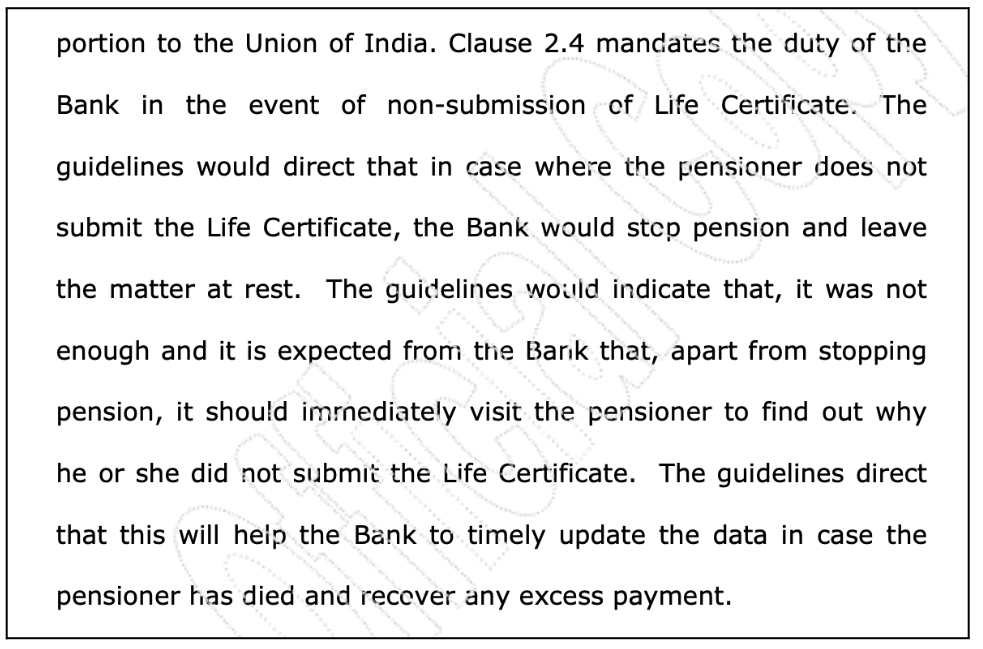
The court stated that although it is the duty of the pensioner to submit the life certificate, the duty also falls on the banker to check in case of non-submission rather than stopping the pension.
The court also expressed its regret for the apathy shown towards the petitioner who is very old. It noted that pension is a right and has a broader significance of ensuring socio-economic justice.
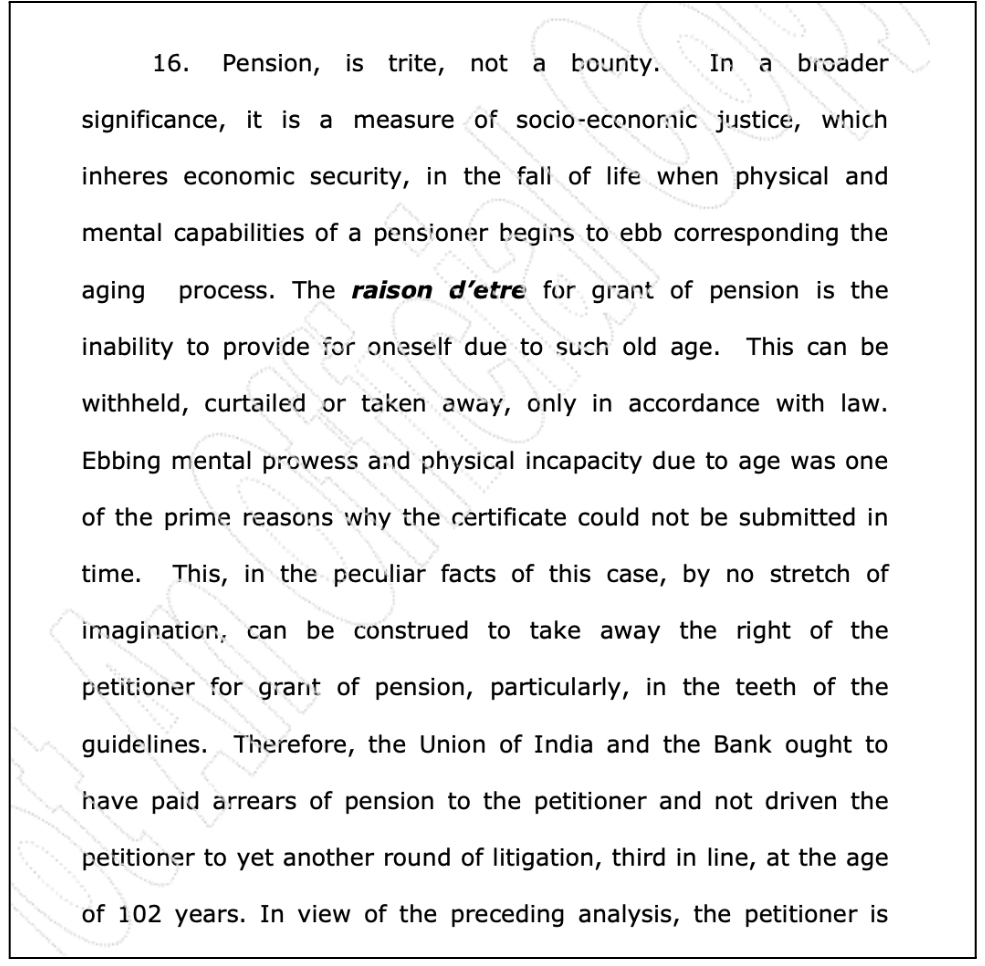
The court clarified that the Bank is not obliged to check in every case but needs to in the cases where there are genuine problems of pensioners who are unable to visit the bank.
Supreme Court: Land acquisition compensation can’t be different based on nature of ownership.
In its judgement relating to Civil appeals filed, Supreme Court struck down the classification made by the Greater NOIDA Authority between Pushtaini and Gair-Pushtaini landlords for the purpose of compensation.
In 1998, the Board of NOIDA classified the landholders into “Pushtaini” and “Gair-Pushtaini” for the purpose of granting additional compensation upon acquisition. The Pushtaini landholders were given additional compensation of @Rs. 3 per sq. yard along with 15% on the compensation awarded for rehabilitation bonus and 10% area of the acquired land. These benefits were not accorded to Gair-Pushtaini.
In 2009, the State government granted approval for the enhanced compensation for a certain class of landholders.
Petitions were filed before the Allahabad High Court challenging the decision of the Board and the State Government’s approval on this.
The Divisional Bench of the High court upheld the classification as reasonable. In the other petitions filed, the Division Bench of the High Court disagreed with the decision of the co-ordinate bench. Hence, it was referred to the Full bench of Allahabad high court. The Full bench also upheld the classification. Then, appeals were filed in the Supreme Court.
Supreme Court looked into the definition of Pushtaini and the rationale for the classification of the land. The court did not agree with the line of argument that only the Pushtaini (hereditary) landowners permanently reside in the land or is their primary source of income. It noted that there are many Gair-Pushtaini who depend on land as their primary source of income. It opined that the burden of proof regarding the classification rests with the authority.
The Supreme court bench referred to various earlier cases and the different tests conducted in those cases to validate the classification. It proceeded to strike down the classification and held that:
- No such differential compensation on basis of such classification is enshrined under Land Acquisition Act.
- There is scope to correct the results of the action taken due to classification in further executive orders, which would be in accordance with the law.
- All the landowners would get the ex-gratia payment and increased base amount.
- Any claim of difference between the different classes needs to be backed by empirical data.
- Even if there is a rational for the classification to ensure the objectives are met, it needs to be legalised by the parent statute.
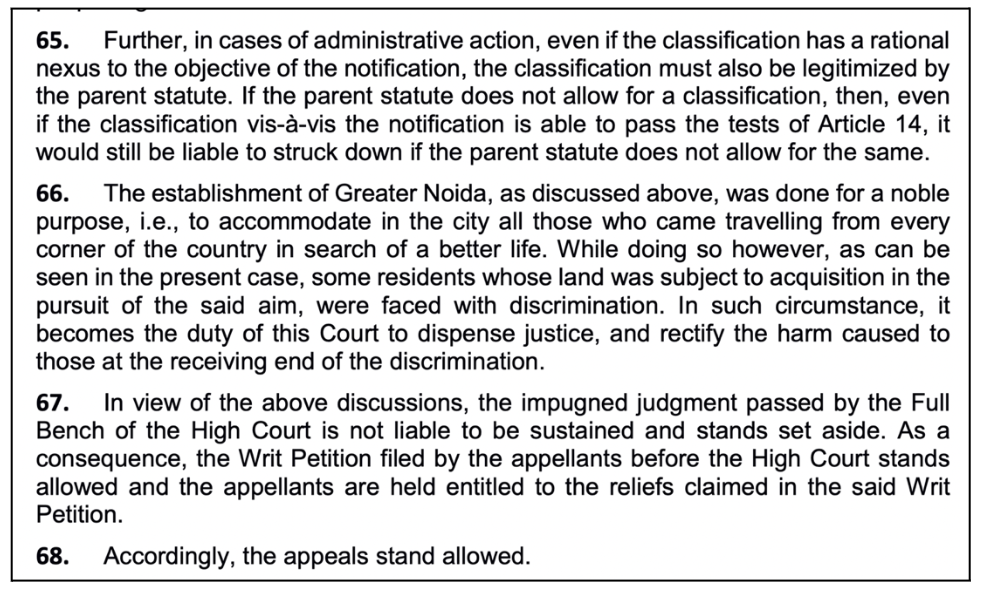
Supreme Court: Order allowing couple to adopt not meant to supplant CARA process
A clarification was issued by Supreme Court regarding an order passed by it in the case, P vs. UoI And Anr. A petition was filed by an unmarried woman seeking termination of pregnancy.
AIIMS reported that there was a high probability of the baby coming out alive if the 29-week pregnancy was attempted to be terminated. Hence, the Court persuaded the woman to opt for delivery. The woman, who is a 21-year-old student, expressed her difficulty in keeping the child.
During the proceedings, the Solicitor General informed the Court about the willingness of a couple to adopt a child. The couple was already registered with the Central Adoption Resource Authority (CARA). The court had passed the order allowing the couple to adopt the child.
Later, the court provided a clarification that the order was passed in view of the extraordinary circumstances and is not meant to supplant the regular adoption procedure of CARA. It stated that in view of the unwillingness expressed by the woman to raise the child, it was required for it to intervene and pass the judgment to allow the adoption.
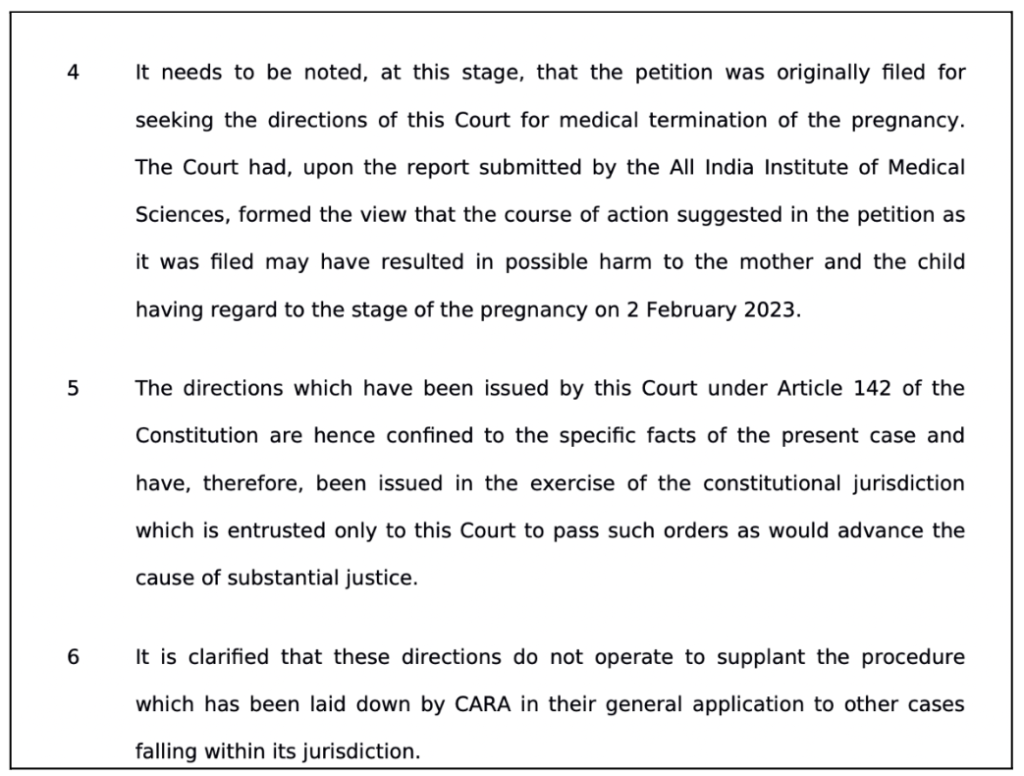
Madras HC: Every Instance of casual police enquiry cannot be termed as Human Rights violation.
In the case Lakshmanan vs. The Secretary SHRC, Madras High Court observed that not every instance of casual police enquiry can be termed as a Human Rights Violation.
The two-judge bench of Madras High court was hearing a plea by an Assistant Commissioner of Police challenging the order of the State Human Rights Commission. The order directed him to pay Rs. 25, 000 to a man and recommended departmental action against the ACP.
The order of SHRC was based on a complaint by one Ramesh, who contended that the petitioner (ACP Lakshmanan) has colluded with third parties and forced him to go for a settlement with respect to some pending payment.
The petitioner put for the argument that he has merely called Ramesh to the station with respect to a complaint and had not conducted any settlement as alleged. The Court was informed that Ramesh has the habit of approaching different police stations with different lawyers and insisting on registering FIRs.
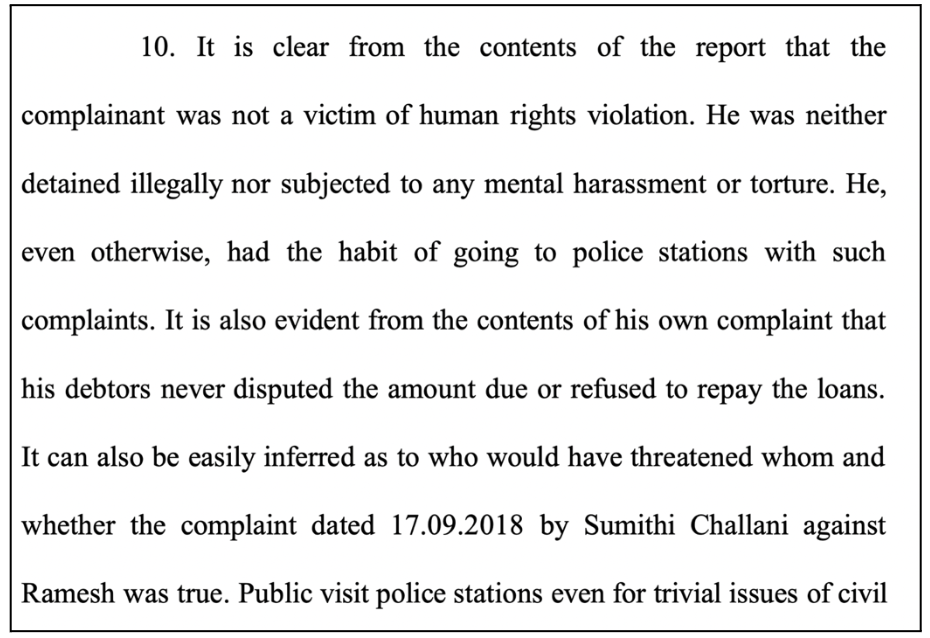
The court noted that there was no allegation of mental harassment or torture or illegal detention, and hence, it cannot be considered as a Human Rights Violation.
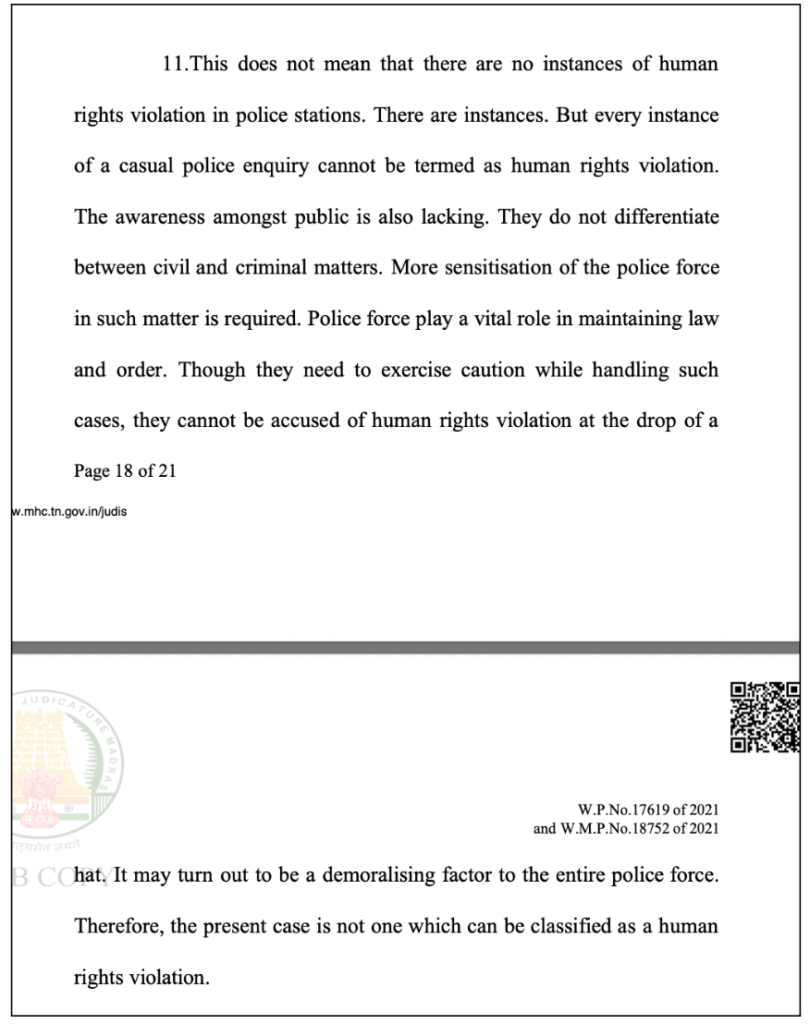
Delhi HC: Allows demolition of portions of Mandir, Masjid in view of larger public interest
In the case, Devendra Kumar ors vs. State (NCT of Delhi) & Ors, Justice Prathiba M Singh of Delhi High Court observed that places of worship cannot encroach on public land and hinder developmental activities meant for the larger segment of the public.
The court was hearing a plea filed by caretakers of “Sanathan Dharam Mandir or Prachin Shiv mandir”, challenging an order issued by the Delhi Government’s Executive Engineer.
The order stated that the mandir was part of the encroachments and unauthorised occupation on the PWD land. However, the petitioners submitted that the temple had not done any encroachment and the removal of the same would cause inconvenience to the devotees.
Delhi Waqf Board was also included in this matter, as a Masjid adjacent to the temple was also on the PWD land.
The proofs submitted by Delhi Government, which include photographs, show that the pedestrian pathway was obstructed by both the mandir & masjid.
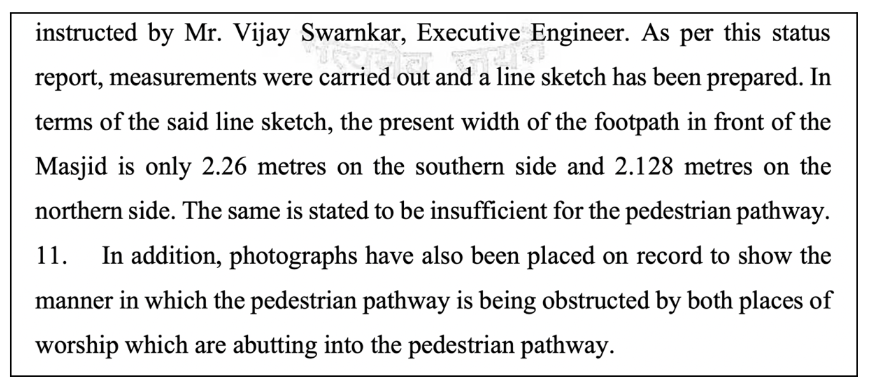
In view of the conflict between the larger public interest and the inconvenience to devotees, the court relied on the judgment in the case Gulam Kadar Ahmadbhai Menon vs. Surat Municipal Corporation.
It noted that removing such places for purpose of carrying out the expansion of the road does not mean that a religious structure is being disrespected. It observed that the larger public interest would outweigh the concerns raised by both the mandir and masjid.
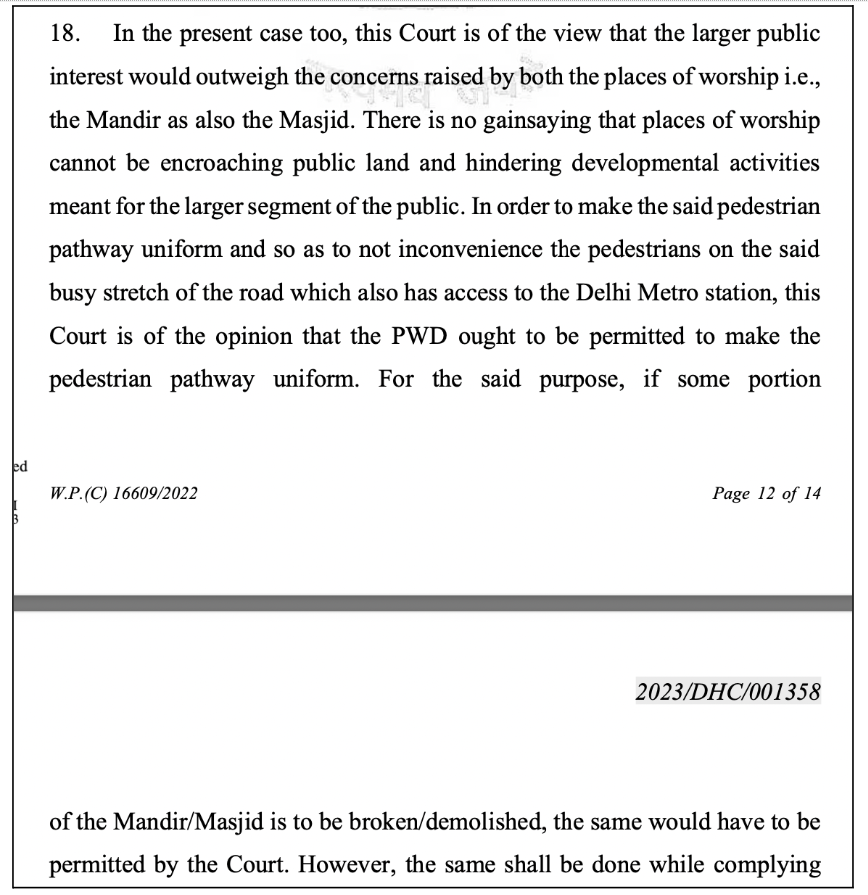
It directed the concerned executive engineer to arrive at a consensus with the caretakers of the mandir and masjid to determine the date on which the demolition would take place.
It further directed that the mandir & masjid or the occupants shall not be treated as unauthorised occupants and that no penalties or damages be levied upon them. It also directed the PWD to ensure toilet facilities for both the mandir and masjid at its own cost.
